Edie Melson's Blog, page 366
September 13, 2015
The Tree Up Ahead
by Sarah Van Diest
Carry each other’s burdens, and in this way you will fulfill the law of Christ. Galatians 6:2
 Up ahead there is a tree. The path goes right up to it. It’s the only tree for miles. Its limbs reach far and its shade is deep. I hope we’ve made it there. We’ve walked so far and for so long. I wish to be there so we can take off our heavy packs and lean them up against its trunk; so we can rest and eat our lunches. Maybe close our eyes a little while.
Up ahead there is a tree. The path goes right up to it. It’s the only tree for miles. Its limbs reach far and its shade is deep. I hope we’ve made it there. We’ve walked so far and for so long. I wish to be there so we can take off our heavy packs and lean them up against its trunk; so we can rest and eat our lunches. Maybe close our eyes a little while.
I hope we are there, because if we aren’t then we still have miles to travel, we still have battles to fight and cold, dark nights to endure. If we aren’t there just yet, I hope we get there soon. We can leave everything under its shade and go freely, lightly on our path, hearts full and eyes forward. I hope we are there now. Do you see it? Please tell me you see the big tree. I am ready to lay my burden down.
Maybe after we rest and as we go on our path we should switch bags. I will carry yours and you carry mine. There seems to be something better about that idea. I don’t mind carrying your burden, my friend. In some ways I think it fits me better anyway. In some ways I own your burden. Yes. I will carry your burden and you carry mine. If you would, please.
This way may not be the norm when it comes to carrying one another’s burdens; usually we talk about them as we unpack them; we try to figure out what it all is and means; where it came from and why it’s in our packs. No, this one is silent, but the sound of our burdens’ weightiness pushes through the air and begs the ears to bend low and listen. Hear its whisper and heed its beckoning cry. Kneel on the soft earth and bow down. Slide the pack off my back and I will slide yours off as well. We will carry each other’s from this point on. This quiet transaction is a sacred act of friendship and devotion. How odd love looks in this light, with packs and trails, and silent exchanges, but it is a beautiful oddness.
My heart is already lighter as I stand up and take the first steps. Your pack is much lighter than mine and much easier for me to bear. And by the smile on your face, it is the same for you. That is good for my soul to see. Your smile brings me life.
It’s not that I don’t still carry some of my own, my pockets are full, but the bulk of it has been lifted from my shoulders. It’s as though I’ve grown up a little on this trail. I see my responsibility as it relates to others. It’s not just about me taking care of me and my issues, it’s about living in such a way as to honor others, in this case, to honor you. And God has provided me with energy and strength to do that in the love I have for you, dear friend. When it was just me, lugging my heavy load around by myself, my drive to do so waned, but because this is for you and for your good, I am eager to follow through. Love does that, you know?
That doesn’t mean I won’t stumble and drop your pack from time to time. I may. It happens when I forget why I’m carrying it for you and start thinking only of myself. It happens when I decide I want to fulfill my desires and forget my commitments. Those are heavy days. But there is rest to be had in the shade tree of the Lord and He will renew my strength when I seek Him. He will renew yours, too.
I don’t know how long we will be carrying each other’s burdens, but I’m happy to do it as long as you need. It fits me well. I don’t know if you know this, but you gave me a gift when you handed me your pack. Your trust in me, even though I won’t be perfect at this, is the gift you’ve given. And oh, my. It is a wonderful gift. ***Sometimes we wait too long to carry one another’s burdens. We see our friends and loved ones struggle, but we are afraid to come along side and quietly slip their packs off. It’s not that we can’t talk about those burdens, sometimes talking and sharing is the rest which takes place under the tree, and the burden may even disappear after that time together, but so often it is a look we see on our friend’s face that tells us their burden is so very heavy. We don’t need to wait for them to ask us for help.
Since carrying one another’s burdens is fulfilling the law of Christ, and the law of Christ is that we love as He loved, it is something we do as the law of Christ works its way through us. It is not another rule or behavior we must adopt, or another task to add to our checklist for being a good Christian, it is the outworking of the Spirit in us. And there is life here. As I picture you taking your pack off your back and I see relief fill your face, I am energized. That’s the way God wired us. (Here’s an article that talks about that: http://www.huffingtonpost.com/david-r-hamilton-phd/kindness-benefits_b_869537.html)
Don’t forget the blessing of letting someone else carry your burden. If it is a blessing for you to carry theirs, then it will be for them to carry yours, too.
I think I see that tree just up ahead.
A friend loves at all times, and a brother is there for times of trouble. Proverbs 17:17.
 Sarah has worked in Christian publishing since 2005 as both and editor and an agent.
Sarah has worked in Christian publishing since 2005 as both and editor and an agent.
Currently, she works with her husband, David, in their agency, the Van Diest Literary Agency. Writing is a growing passion for her as she hopes to bring hope to hurting hearts.
Carry each other’s burdens, and in this way you will fulfill the law of Christ. Galatians 6:2
 Up ahead there is a tree. The path goes right up to it. It’s the only tree for miles. Its limbs reach far and its shade is deep. I hope we’ve made it there. We’ve walked so far and for so long. I wish to be there so we can take off our heavy packs and lean them up against its trunk; so we can rest and eat our lunches. Maybe close our eyes a little while.
Up ahead there is a tree. The path goes right up to it. It’s the only tree for miles. Its limbs reach far and its shade is deep. I hope we’ve made it there. We’ve walked so far and for so long. I wish to be there so we can take off our heavy packs and lean them up against its trunk; so we can rest and eat our lunches. Maybe close our eyes a little while. I hope we are there, because if we aren’t then we still have miles to travel, we still have battles to fight and cold, dark nights to endure. If we aren’t there just yet, I hope we get there soon. We can leave everything under its shade and go freely, lightly on our path, hearts full and eyes forward. I hope we are there now. Do you see it? Please tell me you see the big tree. I am ready to lay my burden down.
Maybe after we rest and as we go on our path we should switch bags. I will carry yours and you carry mine. There seems to be something better about that idea. I don’t mind carrying your burden, my friend. In some ways I think it fits me better anyway. In some ways I own your burden. Yes. I will carry your burden and you carry mine. If you would, please.
This way may not be the norm when it comes to carrying one another’s burdens; usually we talk about them as we unpack them; we try to figure out what it all is and means; where it came from and why it’s in our packs. No, this one is silent, but the sound of our burdens’ weightiness pushes through the air and begs the ears to bend low and listen. Hear its whisper and heed its beckoning cry. Kneel on the soft earth and bow down. Slide the pack off my back and I will slide yours off as well. We will carry each other’s from this point on. This quiet transaction is a sacred act of friendship and devotion. How odd love looks in this light, with packs and trails, and silent exchanges, but it is a beautiful oddness.
My heart is already lighter as I stand up and take the first steps. Your pack is much lighter than mine and much easier for me to bear. And by the smile on your face, it is the same for you. That is good for my soul to see. Your smile brings me life.
It’s not that I don’t still carry some of my own, my pockets are full, but the bulk of it has been lifted from my shoulders. It’s as though I’ve grown up a little on this trail. I see my responsibility as it relates to others. It’s not just about me taking care of me and my issues, it’s about living in such a way as to honor others, in this case, to honor you. And God has provided me with energy and strength to do that in the love I have for you, dear friend. When it was just me, lugging my heavy load around by myself, my drive to do so waned, but because this is for you and for your good, I am eager to follow through. Love does that, you know?
That doesn’t mean I won’t stumble and drop your pack from time to time. I may. It happens when I forget why I’m carrying it for you and start thinking only of myself. It happens when I decide I want to fulfill my desires and forget my commitments. Those are heavy days. But there is rest to be had in the shade tree of the Lord and He will renew my strength when I seek Him. He will renew yours, too.
I don’t know how long we will be carrying each other’s burdens, but I’m happy to do it as long as you need. It fits me well. I don’t know if you know this, but you gave me a gift when you handed me your pack. Your trust in me, even though I won’t be perfect at this, is the gift you’ve given. And oh, my. It is a wonderful gift. ***Sometimes we wait too long to carry one another’s burdens. We see our friends and loved ones struggle, but we are afraid to come along side and quietly slip their packs off. It’s not that we can’t talk about those burdens, sometimes talking and sharing is the rest which takes place under the tree, and the burden may even disappear after that time together, but so often it is a look we see on our friend’s face that tells us their burden is so very heavy. We don’t need to wait for them to ask us for help.
Since carrying one another’s burdens is fulfilling the law of Christ, and the law of Christ is that we love as He loved, it is something we do as the law of Christ works its way through us. It is not another rule or behavior we must adopt, or another task to add to our checklist for being a good Christian, it is the outworking of the Spirit in us. And there is life here. As I picture you taking your pack off your back and I see relief fill your face, I am energized. That’s the way God wired us. (Here’s an article that talks about that: http://www.huffingtonpost.com/david-r-hamilton-phd/kindness-benefits_b_869537.html)
Don’t forget the blessing of letting someone else carry your burden. If it is a blessing for you to carry theirs, then it will be for them to carry yours, too.
I think I see that tree just up ahead.
A friend loves at all times, and a brother is there for times of trouble. Proverbs 17:17.
 Sarah has worked in Christian publishing since 2005 as both and editor and an agent.
Sarah has worked in Christian publishing since 2005 as both and editor and an agent. Currently, she works with her husband, David, in their agency, the Van Diest Literary Agency. Writing is a growing passion for her as she hopes to bring hope to hurting hearts.
Published on September 13, 2015 01:00
September 12, 2015
Words and Names
By Beth Vogt @BethVogt
Words have MEANING and names have POWER.There were a lot of names being tossed around my house.
Not bad names—baby names. My daughter and son-in-love had found out they were having a second daughter, and of course we all started the process of “What do think of ______”?
All sorts of names were offered and some suggestions were even added to their list of possibilities. It was fun, especially when someone found a peculiar name or an indecipherable name—think minimal vowels and an overabundance of consonants.
Being a novelist, I’m more attuned to names than most people. I’m naming the imaginary people populating my books—and then I have to remember those people’s names just as if I were going to send them a birthday card or a Christmas letter every year.
Names are powerful—given names that are often pondered over by our parents before we are born, as well as nicknames and endearments. I’ve loved some of my nicknames—and hated others. And yet, I considered nicknames important and made certain each of my kiddos had one—a special way of saying “I love you” that was all their own.
Yes, words have power—and names can be the most powerful use of words, for better or for worse.
In Your Words: What’s the meaning of your name? If you could change your name, what would you change it to? What do you think of nicknames?
TWEETABLES
Words have meaning & #names have power - thoughts from @BethVogt on @EdieMelson (Click to Tweet)
#Names are powerful - would you change yours if you could? Thoughts from @BethVogt (Click to Tweet)
 Beth K. Vogt believes God’s best often waits behind the doors marked “Never.”
Beth K. Vogt believes God’s best often waits behind the doors marked “Never.”
A nonfiction writer and editor who said she’d never write fiction, Beth is now a novelist with Howard Books. She enjoys writing inspirational contemporary romance because she believes there’s more to happily-ever-after than the fairy tales tell us. Connect with Beth on her website, Twitter, Facebook, or check out her blog on quotes, In Others’ Words.
Words have MEANING and names have POWER.There were a lot of names being tossed around my house.
Not bad names—baby names. My daughter and son-in-love had found out they were having a second daughter, and of course we all started the process of “What do think of ______”?
All sorts of names were offered and some suggestions were even added to their list of possibilities. It was fun, especially when someone found a peculiar name or an indecipherable name—think minimal vowels and an overabundance of consonants.
Being a novelist, I’m more attuned to names than most people. I’m naming the imaginary people populating my books—and then I have to remember those people’s names just as if I were going to send them a birthday card or a Christmas letter every year.
Names are powerful—given names that are often pondered over by our parents before we are born, as well as nicknames and endearments. I’ve loved some of my nicknames—and hated others. And yet, I considered nicknames important and made certain each of my kiddos had one—a special way of saying “I love you” that was all their own.
Yes, words have power—and names can be the most powerful use of words, for better or for worse.
In Your Words: What’s the meaning of your name? If you could change your name, what would you change it to? What do you think of nicknames?
TWEETABLES
Words have meaning & #names have power - thoughts from @BethVogt on @EdieMelson (Click to Tweet)
#Names are powerful - would you change yours if you could? Thoughts from @BethVogt (Click to Tweet)
 Beth K. Vogt believes God’s best often waits behind the doors marked “Never.”
Beth K. Vogt believes God’s best often waits behind the doors marked “Never.” A nonfiction writer and editor who said she’d never write fiction, Beth is now a novelist with Howard Books. She enjoys writing inspirational contemporary romance because she believes there’s more to happily-ever-after than the fairy tales tell us. Connect with Beth on her website, Twitter, Facebook, or check out her blog on quotes, In Others’ Words.
Published on September 12, 2015 01:00
September 11, 2015
Business Cards for Writers (& Speakers)—A 13 Point Checklist
by Vonda Skelton @VondaSkelton
 In this digital world of technology-over-paper, business cards remain strong. After all, those tiny little cards are often the only things agents, editors, and event planners have to trigger their memory of you.
In this digital world of technology-over-paper, business cards remain strong. After all, those tiny little cards are often the only things agents, editors, and event planners have to trigger their memory of you.
So here's a 13-point checklist for business cards that work.
What to include: 2. Headshot. I know first-hand that a business card without a photo is often just another piece of paper. When I teach or speak at conferences, I often receive a lot of business cards. It's not unusual to leave the conference with 50 or more cards! We may have had a wonderful conversation, but there were perhaps a hundred similar wonderful conversations with others as well. And let's face it, my memory just isn't what it used to be. And neither is the memory of that agent or editor or event planner. When you have a recent photo that looks like you, the holder of the card is more likely to remember who you are and the conversation you had. Just be sure it's a recent shot...one that looks like you today.
2. Headshot. I know first-hand that a business card without a photo is often just another piece of paper. When I teach or speak at conferences, I often receive a lot of business cards. It's not unusual to leave the conference with 50 or more cards! We may have had a wonderful conversation, but there were perhaps a hundred similar wonderful conversations with others as well. And let's face it, my memory just isn't what it used to be. And neither is the memory of that agent or editor or event planner. When you have a recent photo that looks like you, the holder of the card is more likely to remember who you are and the conversation you had. Just be sure it's a recent shot...one that looks like you today.
3. Name. Be sure the name on your card is what you go by, not simply the name you were given at birth. I have a friend named Angela, but she goes by Joy. If she had a meeting with me and introduced herself as Joy and I had a conversation with her as Joy, that is the name I will remember her by. But if I get home and can't find a card with the name Joy, it’s unlikely I’ll remember who she is.
4. Website. Be sure to capitalize the words within your website. It’s much easier for people to read and remember your website with capitals: www.VondaSkelton.com.
 5. Email address. Create a professional email address. daddysgirl55@hicktown.com may be cute for your family email, but it can negatively affect your credibility as a professional. Your name at your website address works well. Your name at Gmail works well, too.
5. Email address. Create a professional email address. daddysgirl55@hicktown.com may be cute for your family email, but it can negatively affect your credibility as a professional. Your name at your website address works well. Your name at Gmail works well, too.
6. Phone number. You don't necessarily need both a home and a mobile number, but you DO need a number where you can be reached easily, one that you'll check several times a day.
7. You DON'T have to include your street address. We used to recommend leaving off home addresses for safety reasons, but in today's world, a bad guy can find our addresses, check out our streets, and view our front doors within seconds. Reality is that snail mail is rarely used anymore.And spelling out your physical address takes up valuable real estate without adding anything.
8. Business name. If you have a business name other than your own name, be sure to include it on your card.
9. Social media info. If you have space, include your social media names.
Style considerations:10. Font. Be sure the font is easy to read and not too small. A script style may not be your best option.
11. Shape and size. I've seen a lot of unique business cards in a variety of shapes and sizes. And even though the unique shapes and sizes are interesting and memorable, veering from the norm can bring unexpected problems. For one thing, non-standard shapes and sizes don't fit into prepared business card sheets or into stacks of cards in desk drawers. Even in this digital age, many still enjoy old school organization.
 12. Paper finish. Do you write notes on business cards? I certainly do. And so do many others. After meeting with people, I'll likely flip the card over and write notes to myself about their projects, reminders about something I'm supposed to follow up on, or additional information about talents or interests. If cards are finished in a slick, glossy coating, it's impossible to write these important notes on them.
12. Paper finish. Do you write notes on business cards? I certainly do. And so do many others. After meeting with people, I'll likely flip the card over and write notes to myself about their projects, reminders about something I'm supposed to follow up on, or additional information about talents or interests. If cards are finished in a slick, glossy coating, it's impossible to write these important notes on them.
13. Colors. Be sure your colors are a good representation of you and your brand. A visual theme carried from your website to your one-sheet to your business cards works well. And remember that very dark colors don't allow the receiver to write on the cards.
So there they are, 13 things to consider as you consider your business card. A stylish, legible, interesting business card with necessary information will go a long way to making you look professional and ready to work.
What have you found that works—or doesn’t work—on business cards? Don’t forget to join the conversation!
TWEETABLEBusiness Cards for Writers (& Speakers) - 13 tips from @VondaSkelton on @EdieMelson (Click to Tweet)
Business Cards Done Well Make a Valuable Impression - Tips from @VondaSkelton (Click to Tweet)
 Vonda Skelton is a speaker and the author of four books: Seeing Through the Lies: Unmasking the Myths Women Believe and the 3-book Bitsy Burroughs mysteries for children 8-12 yo. She’s the founder and co-director of Christian Communicators Conference, offering speakers’ training and community for Christian women called to ministry. Vonda is a frequent instructor at writer’s conferences and keynotes at business, women’s, and associational events. You can find out more about Vonda, as well as writing opportunities and instruction at her writer’s blog, The Christian Writer’s Den at VondaSkelton.com.
Vonda Skelton is a speaker and the author of four books: Seeing Through the Lies: Unmasking the Myths Women Believe and the 3-book Bitsy Burroughs mysteries for children 8-12 yo. She’s the founder and co-director of Christian Communicators Conference, offering speakers’ training and community for Christian women called to ministry. Vonda is a frequent instructor at writer’s conferences and keynotes at business, women’s, and associational events. You can find out more about Vonda, as well as writing opportunities and instruction at her writer’s blog, The Christian Writer’s Den at VondaSkelton.com.
 In this digital world of technology-over-paper, business cards remain strong. After all, those tiny little cards are often the only things agents, editors, and event planners have to trigger their memory of you.
In this digital world of technology-over-paper, business cards remain strong. After all, those tiny little cards are often the only things agents, editors, and event planners have to trigger their memory of you.So here's a 13-point checklist for business cards that work.
What to include:
 2. Headshot. I know first-hand that a business card without a photo is often just another piece of paper. When I teach or speak at conferences, I often receive a lot of business cards. It's not unusual to leave the conference with 50 or more cards! We may have had a wonderful conversation, but there were perhaps a hundred similar wonderful conversations with others as well. And let's face it, my memory just isn't what it used to be. And neither is the memory of that agent or editor or event planner. When you have a recent photo that looks like you, the holder of the card is more likely to remember who you are and the conversation you had. Just be sure it's a recent shot...one that looks like you today.
2. Headshot. I know first-hand that a business card without a photo is often just another piece of paper. When I teach or speak at conferences, I often receive a lot of business cards. It's not unusual to leave the conference with 50 or more cards! We may have had a wonderful conversation, but there were perhaps a hundred similar wonderful conversations with others as well. And let's face it, my memory just isn't what it used to be. And neither is the memory of that agent or editor or event planner. When you have a recent photo that looks like you, the holder of the card is more likely to remember who you are and the conversation you had. Just be sure it's a recent shot...one that looks like you today.3. Name. Be sure the name on your card is what you go by, not simply the name you were given at birth. I have a friend named Angela, but she goes by Joy. If she had a meeting with me and introduced herself as Joy and I had a conversation with her as Joy, that is the name I will remember her by. But if I get home and can't find a card with the name Joy, it’s unlikely I’ll remember who she is.
4. Website. Be sure to capitalize the words within your website. It’s much easier for people to read and remember your website with capitals: www.VondaSkelton.com.
 5. Email address. Create a professional email address. daddysgirl55@hicktown.com may be cute for your family email, but it can negatively affect your credibility as a professional. Your name at your website address works well. Your name at Gmail works well, too.
5. Email address. Create a professional email address. daddysgirl55@hicktown.com may be cute for your family email, but it can negatively affect your credibility as a professional. Your name at your website address works well. Your name at Gmail works well, too.6. Phone number. You don't necessarily need both a home and a mobile number, but you DO need a number where you can be reached easily, one that you'll check several times a day.
7. You DON'T have to include your street address. We used to recommend leaving off home addresses for safety reasons, but in today's world, a bad guy can find our addresses, check out our streets, and view our front doors within seconds. Reality is that snail mail is rarely used anymore.And spelling out your physical address takes up valuable real estate without adding anything.
8. Business name. If you have a business name other than your own name, be sure to include it on your card.
9. Social media info. If you have space, include your social media names.
Style considerations:10. Font. Be sure the font is easy to read and not too small. A script style may not be your best option.
11. Shape and size. I've seen a lot of unique business cards in a variety of shapes and sizes. And even though the unique shapes and sizes are interesting and memorable, veering from the norm can bring unexpected problems. For one thing, non-standard shapes and sizes don't fit into prepared business card sheets or into stacks of cards in desk drawers. Even in this digital age, many still enjoy old school organization.
 12. Paper finish. Do you write notes on business cards? I certainly do. And so do many others. After meeting with people, I'll likely flip the card over and write notes to myself about their projects, reminders about something I'm supposed to follow up on, or additional information about talents or interests. If cards are finished in a slick, glossy coating, it's impossible to write these important notes on them.
12. Paper finish. Do you write notes on business cards? I certainly do. And so do many others. After meeting with people, I'll likely flip the card over and write notes to myself about their projects, reminders about something I'm supposed to follow up on, or additional information about talents or interests. If cards are finished in a slick, glossy coating, it's impossible to write these important notes on them.13. Colors. Be sure your colors are a good representation of you and your brand. A visual theme carried from your website to your one-sheet to your business cards works well. And remember that very dark colors don't allow the receiver to write on the cards.
So there they are, 13 things to consider as you consider your business card. A stylish, legible, interesting business card with necessary information will go a long way to making you look professional and ready to work.
What have you found that works—or doesn’t work—on business cards? Don’t forget to join the conversation!
TWEETABLEBusiness Cards for Writers (& Speakers) - 13 tips from @VondaSkelton on @EdieMelson (Click to Tweet)
Business Cards Done Well Make a Valuable Impression - Tips from @VondaSkelton (Click to Tweet)
 Vonda Skelton is a speaker and the author of four books: Seeing Through the Lies: Unmasking the Myths Women Believe and the 3-book Bitsy Burroughs mysteries for children 8-12 yo. She’s the founder and co-director of Christian Communicators Conference, offering speakers’ training and community for Christian women called to ministry. Vonda is a frequent instructor at writer’s conferences and keynotes at business, women’s, and associational events. You can find out more about Vonda, as well as writing opportunities and instruction at her writer’s blog, The Christian Writer’s Den at VondaSkelton.com.
Vonda Skelton is a speaker and the author of four books: Seeing Through the Lies: Unmasking the Myths Women Believe and the 3-book Bitsy Burroughs mysteries for children 8-12 yo. She’s the founder and co-director of Christian Communicators Conference, offering speakers’ training and community for Christian women called to ministry. Vonda is a frequent instructor at writer’s conferences and keynotes at business, women’s, and associational events. You can find out more about Vonda, as well as writing opportunities and instruction at her writer’s blog, The Christian Writer’s Den at VondaSkelton.com.
Published on September 11, 2015 01:00
September 10, 2015
What Goes into Choosing a Book Title?
by Warren Adler @WarrenAdler
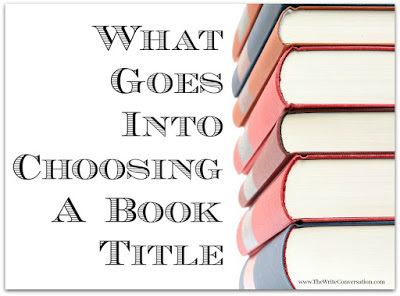 What Goes into Choosing a Book TitleYou can’t judge a book by its title.
What Goes into Choosing a Book TitleYou can’t judge a book by its title.
You’ve heard the saying forever, mostly in reference to book covers. But the real issue concerns the title that cleverly describes the contents that lie within the covers. To be authentic it must have the ring of truth, but the ring should be so piercing and articulate that it makes a serious reader take notice.Creating book titles for novels is like naming your children. It creates a special individual identity and requires intense reflection. A great title must convey an image that synthesizes the story, convey its meaning and connect with the most casual book searcher who may or may not remember the name of the author or, in the case, of serial novels, the name of the principal character who will be embarking on another fictional journey. In the case of an authorial name whose past stories have created a kind of brand addiction in the reader’s mind, this might not apply. In such cases, the writer’s name trumps the title. In such cases time is the enemy of the brand and keeping one’s authorial name alive is a challenge to be dealt with elsewhere.
Book Titles That Hit the Mark Although I have numerous favorite titles, especially among special authors that have entered my individual canon, some are to my mind standouts. My most compelling list includes Hemingway’s “Farewell to Arms” and “The Sun Also Rises” which marvelously captures the heart and soul of the author’s story. Another favorite title is from Charles Dickens who was prone to name, because of his brand name popularity, the majority of his great novels after his main character. But in “Great Expectations” and “A Christmas Carol,” he is right on target. Scott FitzGerald, too, also scored a bulls-eye with “This Side of Paradise” and “Tender is the Night.” I could go on and on.
A History of Naming My Novels Coming up with the exact right title is an art form.My own experiences with titling my many novels and numerous short stories has convinced me that coming up with exactly the right title is an art form unto itself. There is no way beforehand to know if a title resonates for the book searcher. But in all modesty, I believe I got most of my titles right. I am still fond of “The War of the Roses” which is somewhat of a rip-off of the famous 15thcentury dynastic wars for the throne of England. Another title which became a movie “Random Hearts,” was, in my mind, the best rendition of the novel’s content and an obsessive theme in most of my fifty odd novels and short stories, the mysterious and yes, random, nature of love. Believe me, I have agonized for days, weeks and months over some of my titles. Some have been battles that I lost with publishers. One in particular stands out and still pains me deeply. I wrote a story about a Washington newspaper in which the owner and editors became so obsessed with power having brought down a President that they assumed they could also promote one of their choice. I knew the inner workings of the news business from my own experience working on a New York newspaper and had titled my novel “Ink” which I thought made perfect sense. The publisher insisted on the title “The Henderson Equation,” a rip-off of the kind of titling that was hitting the best-seller lists in those days. I tried my best to dissuade the publisher, but finally and cowardly surrendered. I still hate the title and with the new technology and now that the rights have been reversed to me I intend to change it back to “Ink.” My first novel whose story was about how a married Senator used his cunning and fortune to recover his political footing after a scandal in which his clandestine lover drowned was titled “Options.” I was the culprit on that one. It sounded more financial than suspenseful. The paperback version was subsequently renamed “Waters of Decision.” Years later when I got the rights back I renamed it “Undertow,” which, from my perspective, hit the mark. I also might have hurt the novel which I named “Blood Ties” about a family of arms dealers who have trouble resolving a problem when they are suddenly confronted with a cornucopia of nuclear material used to make atomic bombs. Unfortunately, although the title was descriptive of the contents, it had been used so many times by other authors that it is has become a cliché. One cannot copyright a title. “Torture Man,” the new novel coming out in November, deals with the inner turmoil and moral dilemma of those on both ends of the torture controversy.
Coming up with the exact right title is an art form.My own experiences with titling my many novels and numerous short stories has convinced me that coming up with exactly the right title is an art form unto itself. There is no way beforehand to know if a title resonates for the book searcher. But in all modesty, I believe I got most of my titles right. I am still fond of “The War of the Roses” which is somewhat of a rip-off of the famous 15thcentury dynastic wars for the throne of England. Another title which became a movie “Random Hearts,” was, in my mind, the best rendition of the novel’s content and an obsessive theme in most of my fifty odd novels and short stories, the mysterious and yes, random, nature of love. Believe me, I have agonized for days, weeks and months over some of my titles. Some have been battles that I lost with publishers. One in particular stands out and still pains me deeply. I wrote a story about a Washington newspaper in which the owner and editors became so obsessed with power having brought down a President that they assumed they could also promote one of their choice. I knew the inner workings of the news business from my own experience working on a New York newspaper and had titled my novel “Ink” which I thought made perfect sense. The publisher insisted on the title “The Henderson Equation,” a rip-off of the kind of titling that was hitting the best-seller lists in those days. I tried my best to dissuade the publisher, but finally and cowardly surrendered. I still hate the title and with the new technology and now that the rights have been reversed to me I intend to change it back to “Ink.” My first novel whose story was about how a married Senator used his cunning and fortune to recover his political footing after a scandal in which his clandestine lover drowned was titled “Options.” I was the culprit on that one. It sounded more financial than suspenseful. The paperback version was subsequently renamed “Waters of Decision.” Years later when I got the rights back I renamed it “Undertow,” which, from my perspective, hit the mark. I also might have hurt the novel which I named “Blood Ties” about a family of arms dealers who have trouble resolving a problem when they are suddenly confronted with a cornucopia of nuclear material used to make atomic bombs. Unfortunately, although the title was descriptive of the contents, it had been used so many times by other authors that it is has become a cliché. One cannot copyright a title. “Torture Man,” the new novel coming out in November, deals with the inner turmoil and moral dilemma of those on both ends of the torture controversy.
Make Every Word Count Make Every Word CountOf course, there is a deep kinship between advertising logos, catchy headlines, slogan creation and book titling and I spent half my life performing the former and the other half performing the latter. For nearly twenty years, I ran my own advertising agency in Washington that specialized in real estate promotion and politics. For the record, my only ambition which began as a teenage dream, was to write novels and it required many years of pursuit and rejection before that dream was realized. In the real estate area I was hired to name housing and apartment projects and create promotional and advertising campaigns to attract people to the sites. Whole areas of the Washington metropolitan area and places in Maryland and Virginia are scattered with my creations. King Park in Virginia, is just one example. I named a motel in Maryland “Colony Seven,” since Maryland was the seventh colony. I named an apartment project on Massachusetts Avenue “Foxhall” because it was the road that led to Georgetown, one of the toniest areas in Washington. Counties in Britain were a favorite source of creative names, not only for the project but for the styles of each home being offered. My least challenging creation was naming a complex on the shores of the Potomac “Watergate.” It was just a vast wasteland on the edge of what was a little restaurant of the same name. When I acquired the account as its first advertising agency I thought it was good enough to use and the clients agreed. Who knew what history would make of the name? Many of my friends think it was my greatest career achievement. Sometimes my alleged cleverness got me in hot water. One of my clients was selling lots in Virginia and my headline for its sale was “The Greatest Earth on Show” a rip-off of the Ringling Bros Barnum and Bailey Circus slogan. I was threatened with legal action and quickly capitulated. On the balance in my efforts of book titling, I give myself generally good grades. In the past I allowed my foreign publishers to change the titles to fit with what they believed would be more attractive to their home country audiences. My new policy as the interest in my books are resurrecting is under no circumstances will I allow any title changes, a policy that goes with all adaptations of my books to movies, television and live theater.
Make Every Word CountOf course, there is a deep kinship between advertising logos, catchy headlines, slogan creation and book titling and I spent half my life performing the former and the other half performing the latter. For nearly twenty years, I ran my own advertising agency in Washington that specialized in real estate promotion and politics. For the record, my only ambition which began as a teenage dream, was to write novels and it required many years of pursuit and rejection before that dream was realized. In the real estate area I was hired to name housing and apartment projects and create promotional and advertising campaigns to attract people to the sites. Whole areas of the Washington metropolitan area and places in Maryland and Virginia are scattered with my creations. King Park in Virginia, is just one example. I named a motel in Maryland “Colony Seven,” since Maryland was the seventh colony. I named an apartment project on Massachusetts Avenue “Foxhall” because it was the road that led to Georgetown, one of the toniest areas in Washington. Counties in Britain were a favorite source of creative names, not only for the project but for the styles of each home being offered. My least challenging creation was naming a complex on the shores of the Potomac “Watergate.” It was just a vast wasteland on the edge of what was a little restaurant of the same name. When I acquired the account as its first advertising agency I thought it was good enough to use and the clients agreed. Who knew what history would make of the name? Many of my friends think it was my greatest career achievement. Sometimes my alleged cleverness got me in hot water. One of my clients was selling lots in Virginia and my headline for its sale was “The Greatest Earth on Show” a rip-off of the Ringling Bros Barnum and Bailey Circus slogan. I was threatened with legal action and quickly capitulated. On the balance in my efforts of book titling, I give myself generally good grades. In the past I allowed my foreign publishers to change the titles to fit with what they believed would be more attractive to their home country audiences. My new policy as the interest in my books are resurrecting is under no circumstances will I allow any title changes, a policy that goes with all adaptations of my books to movies, television and live theater.
TWEETABLES
What Goes into Choosing a Book Title - thoughts from Great American Novelist, @WarrenAdler (Click to Tweet)
Choosing exactly the right title for your book is an art form unto itself - @WarrenAdler (Click to Tweet)
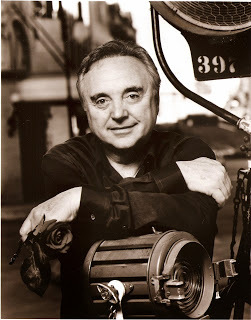 Warren Adler is best known for The War of the Roses, his masterpiece fictionalization of a macabre divorce turned into the Golden Globe and BAFTA nominated dark comedy hit starring Michael Douglas, Kathleen Turner and Danny DeVito. Adler's international hit stage adaptation of the novel will premiere on Broadway in 2015-2016. Adler has also optioned and sold film rights for a number of his works including Random Hearts (starring Harrison Ford and Kristen Scott Thomas) and The Sunset Gang (produced by Linda Lavin for PBS' American Playhouse series starring Jerry Stiller, Uta Hagen, Harold Gould and Doris Roberts). In recent development are the Broadway Production of The War of the Roses, to be produced by Jay and Cindy Gutterman, The War of the Roses - The Children (Grey Eagle Films and Permut Presentations), a feature film adaptation of the sequel to Adler's iconic divorce story, Target Churchill (Grey Eagle Films and Solution Entertainment),Mourning Glory, to be adapted by Karen Leigh Hopkins, and Capitol Crimes (Grey Eagle Films and Sennet Entertainment), a television series based on his Fiona Fitzgerald mystery series. Warren Adler's newest thriller, Treadmill, is officially available.
Warren Adler is best known for The War of the Roses, his masterpiece fictionalization of a macabre divorce turned into the Golden Globe and BAFTA nominated dark comedy hit starring Michael Douglas, Kathleen Turner and Danny DeVito. Adler's international hit stage adaptation of the novel will premiere on Broadway in 2015-2016. Adler has also optioned and sold film rights for a number of his works including Random Hearts (starring Harrison Ford and Kristen Scott Thomas) and The Sunset Gang (produced by Linda Lavin for PBS' American Playhouse series starring Jerry Stiller, Uta Hagen, Harold Gould and Doris Roberts). In recent development are the Broadway Production of The War of the Roses, to be produced by Jay and Cindy Gutterman, The War of the Roses - The Children (Grey Eagle Films and Permut Presentations), a feature film adaptation of the sequel to Adler's iconic divorce story, Target Churchill (Grey Eagle Films and Solution Entertainment),Mourning Glory, to be adapted by Karen Leigh Hopkins, and Capitol Crimes (Grey Eagle Films and Sennet Entertainment), a television series based on his Fiona Fitzgerald mystery series. Warren Adler's newest thriller, Treadmill, is officially available.
 What Goes into Choosing a Book TitleYou can’t judge a book by its title.
What Goes into Choosing a Book TitleYou can’t judge a book by its title.You’ve heard the saying forever, mostly in reference to book covers. But the real issue concerns the title that cleverly describes the contents that lie within the covers. To be authentic it must have the ring of truth, but the ring should be so piercing and articulate that it makes a serious reader take notice.Creating book titles for novels is like naming your children. It creates a special individual identity and requires intense reflection. A great title must convey an image that synthesizes the story, convey its meaning and connect with the most casual book searcher who may or may not remember the name of the author or, in the case, of serial novels, the name of the principal character who will be embarking on another fictional journey. In the case of an authorial name whose past stories have created a kind of brand addiction in the reader’s mind, this might not apply. In such cases, the writer’s name trumps the title. In such cases time is the enemy of the brand and keeping one’s authorial name alive is a challenge to be dealt with elsewhere.
Book Titles That Hit the Mark Although I have numerous favorite titles, especially among special authors that have entered my individual canon, some are to my mind standouts. My most compelling list includes Hemingway’s “Farewell to Arms” and “The Sun Also Rises” which marvelously captures the heart and soul of the author’s story. Another favorite title is from Charles Dickens who was prone to name, because of his brand name popularity, the majority of his great novels after his main character. But in “Great Expectations” and “A Christmas Carol,” he is right on target. Scott FitzGerald, too, also scored a bulls-eye with “This Side of Paradise” and “Tender is the Night.” I could go on and on.
A History of Naming My Novels
 Coming up with the exact right title is an art form.My own experiences with titling my many novels and numerous short stories has convinced me that coming up with exactly the right title is an art form unto itself. There is no way beforehand to know if a title resonates for the book searcher. But in all modesty, I believe I got most of my titles right. I am still fond of “The War of the Roses” which is somewhat of a rip-off of the famous 15thcentury dynastic wars for the throne of England. Another title which became a movie “Random Hearts,” was, in my mind, the best rendition of the novel’s content and an obsessive theme in most of my fifty odd novels and short stories, the mysterious and yes, random, nature of love. Believe me, I have agonized for days, weeks and months over some of my titles. Some have been battles that I lost with publishers. One in particular stands out and still pains me deeply. I wrote a story about a Washington newspaper in which the owner and editors became so obsessed with power having brought down a President that they assumed they could also promote one of their choice. I knew the inner workings of the news business from my own experience working on a New York newspaper and had titled my novel “Ink” which I thought made perfect sense. The publisher insisted on the title “The Henderson Equation,” a rip-off of the kind of titling that was hitting the best-seller lists in those days. I tried my best to dissuade the publisher, but finally and cowardly surrendered. I still hate the title and with the new technology and now that the rights have been reversed to me I intend to change it back to “Ink.” My first novel whose story was about how a married Senator used his cunning and fortune to recover his political footing after a scandal in which his clandestine lover drowned was titled “Options.” I was the culprit on that one. It sounded more financial than suspenseful. The paperback version was subsequently renamed “Waters of Decision.” Years later when I got the rights back I renamed it “Undertow,” which, from my perspective, hit the mark. I also might have hurt the novel which I named “Blood Ties” about a family of arms dealers who have trouble resolving a problem when they are suddenly confronted with a cornucopia of nuclear material used to make atomic bombs. Unfortunately, although the title was descriptive of the contents, it had been used so many times by other authors that it is has become a cliché. One cannot copyright a title. “Torture Man,” the new novel coming out in November, deals with the inner turmoil and moral dilemma of those on both ends of the torture controversy.
Coming up with the exact right title is an art form.My own experiences with titling my many novels and numerous short stories has convinced me that coming up with exactly the right title is an art form unto itself. There is no way beforehand to know if a title resonates for the book searcher. But in all modesty, I believe I got most of my titles right. I am still fond of “The War of the Roses” which is somewhat of a rip-off of the famous 15thcentury dynastic wars for the throne of England. Another title which became a movie “Random Hearts,” was, in my mind, the best rendition of the novel’s content and an obsessive theme in most of my fifty odd novels and short stories, the mysterious and yes, random, nature of love. Believe me, I have agonized for days, weeks and months over some of my titles. Some have been battles that I lost with publishers. One in particular stands out and still pains me deeply. I wrote a story about a Washington newspaper in which the owner and editors became so obsessed with power having brought down a President that they assumed they could also promote one of their choice. I knew the inner workings of the news business from my own experience working on a New York newspaper and had titled my novel “Ink” which I thought made perfect sense. The publisher insisted on the title “The Henderson Equation,” a rip-off of the kind of titling that was hitting the best-seller lists in those days. I tried my best to dissuade the publisher, but finally and cowardly surrendered. I still hate the title and with the new technology and now that the rights have been reversed to me I intend to change it back to “Ink.” My first novel whose story was about how a married Senator used his cunning and fortune to recover his political footing after a scandal in which his clandestine lover drowned was titled “Options.” I was the culprit on that one. It sounded more financial than suspenseful. The paperback version was subsequently renamed “Waters of Decision.” Years later when I got the rights back I renamed it “Undertow,” which, from my perspective, hit the mark. I also might have hurt the novel which I named “Blood Ties” about a family of arms dealers who have trouble resolving a problem when they are suddenly confronted with a cornucopia of nuclear material used to make atomic bombs. Unfortunately, although the title was descriptive of the contents, it had been used so many times by other authors that it is has become a cliché. One cannot copyright a title. “Torture Man,” the new novel coming out in November, deals with the inner turmoil and moral dilemma of those on both ends of the torture controversy. Make Every Word Count
 Make Every Word CountOf course, there is a deep kinship between advertising logos, catchy headlines, slogan creation and book titling and I spent half my life performing the former and the other half performing the latter. For nearly twenty years, I ran my own advertising agency in Washington that specialized in real estate promotion and politics. For the record, my only ambition which began as a teenage dream, was to write novels and it required many years of pursuit and rejection before that dream was realized. In the real estate area I was hired to name housing and apartment projects and create promotional and advertising campaigns to attract people to the sites. Whole areas of the Washington metropolitan area and places in Maryland and Virginia are scattered with my creations. King Park in Virginia, is just one example. I named a motel in Maryland “Colony Seven,” since Maryland was the seventh colony. I named an apartment project on Massachusetts Avenue “Foxhall” because it was the road that led to Georgetown, one of the toniest areas in Washington. Counties in Britain were a favorite source of creative names, not only for the project but for the styles of each home being offered. My least challenging creation was naming a complex on the shores of the Potomac “Watergate.” It was just a vast wasteland on the edge of what was a little restaurant of the same name. When I acquired the account as its first advertising agency I thought it was good enough to use and the clients agreed. Who knew what history would make of the name? Many of my friends think it was my greatest career achievement. Sometimes my alleged cleverness got me in hot water. One of my clients was selling lots in Virginia and my headline for its sale was “The Greatest Earth on Show” a rip-off of the Ringling Bros Barnum and Bailey Circus slogan. I was threatened with legal action and quickly capitulated. On the balance in my efforts of book titling, I give myself generally good grades. In the past I allowed my foreign publishers to change the titles to fit with what they believed would be more attractive to their home country audiences. My new policy as the interest in my books are resurrecting is under no circumstances will I allow any title changes, a policy that goes with all adaptations of my books to movies, television and live theater.
Make Every Word CountOf course, there is a deep kinship between advertising logos, catchy headlines, slogan creation and book titling and I spent half my life performing the former and the other half performing the latter. For nearly twenty years, I ran my own advertising agency in Washington that specialized in real estate promotion and politics. For the record, my only ambition which began as a teenage dream, was to write novels and it required many years of pursuit and rejection before that dream was realized. In the real estate area I was hired to name housing and apartment projects and create promotional and advertising campaigns to attract people to the sites. Whole areas of the Washington metropolitan area and places in Maryland and Virginia are scattered with my creations. King Park in Virginia, is just one example. I named a motel in Maryland “Colony Seven,” since Maryland was the seventh colony. I named an apartment project on Massachusetts Avenue “Foxhall” because it was the road that led to Georgetown, one of the toniest areas in Washington. Counties in Britain were a favorite source of creative names, not only for the project but for the styles of each home being offered. My least challenging creation was naming a complex on the shores of the Potomac “Watergate.” It was just a vast wasteland on the edge of what was a little restaurant of the same name. When I acquired the account as its first advertising agency I thought it was good enough to use and the clients agreed. Who knew what history would make of the name? Many of my friends think it was my greatest career achievement. Sometimes my alleged cleverness got me in hot water. One of my clients was selling lots in Virginia and my headline for its sale was “The Greatest Earth on Show” a rip-off of the Ringling Bros Barnum and Bailey Circus slogan. I was threatened with legal action and quickly capitulated. On the balance in my efforts of book titling, I give myself generally good grades. In the past I allowed my foreign publishers to change the titles to fit with what they believed would be more attractive to their home country audiences. My new policy as the interest in my books are resurrecting is under no circumstances will I allow any title changes, a policy that goes with all adaptations of my books to movies, television and live theater.TWEETABLES
What Goes into Choosing a Book Title - thoughts from Great American Novelist, @WarrenAdler (Click to Tweet)
Choosing exactly the right title for your book is an art form unto itself - @WarrenAdler (Click to Tweet)
 Warren Adler is best known for The War of the Roses, his masterpiece fictionalization of a macabre divorce turned into the Golden Globe and BAFTA nominated dark comedy hit starring Michael Douglas, Kathleen Turner and Danny DeVito. Adler's international hit stage adaptation of the novel will premiere on Broadway in 2015-2016. Adler has also optioned and sold film rights for a number of his works including Random Hearts (starring Harrison Ford and Kristen Scott Thomas) and The Sunset Gang (produced by Linda Lavin for PBS' American Playhouse series starring Jerry Stiller, Uta Hagen, Harold Gould and Doris Roberts). In recent development are the Broadway Production of The War of the Roses, to be produced by Jay and Cindy Gutterman, The War of the Roses - The Children (Grey Eagle Films and Permut Presentations), a feature film adaptation of the sequel to Adler's iconic divorce story, Target Churchill (Grey Eagle Films and Solution Entertainment),Mourning Glory, to be adapted by Karen Leigh Hopkins, and Capitol Crimes (Grey Eagle Films and Sennet Entertainment), a television series based on his Fiona Fitzgerald mystery series. Warren Adler's newest thriller, Treadmill, is officially available.
Warren Adler is best known for The War of the Roses, his masterpiece fictionalization of a macabre divorce turned into the Golden Globe and BAFTA nominated dark comedy hit starring Michael Douglas, Kathleen Turner and Danny DeVito. Adler's international hit stage adaptation of the novel will premiere on Broadway in 2015-2016. Adler has also optioned and sold film rights for a number of his works including Random Hearts (starring Harrison Ford and Kristen Scott Thomas) and The Sunset Gang (produced by Linda Lavin for PBS' American Playhouse series starring Jerry Stiller, Uta Hagen, Harold Gould and Doris Roberts). In recent development are the Broadway Production of The War of the Roses, to be produced by Jay and Cindy Gutterman, The War of the Roses - The Children (Grey Eagle Films and Permut Presentations), a feature film adaptation of the sequel to Adler's iconic divorce story, Target Churchill (Grey Eagle Films and Solution Entertainment),Mourning Glory, to be adapted by Karen Leigh Hopkins, and Capitol Crimes (Grey Eagle Films and Sennet Entertainment), a television series based on his Fiona Fitzgerald mystery series. Warren Adler's newest thriller, Treadmill, is officially available.
Published on September 10, 2015 01:00
September 9, 2015
PSL - Publishing as a Second Language—What is a Simultaneous Submission
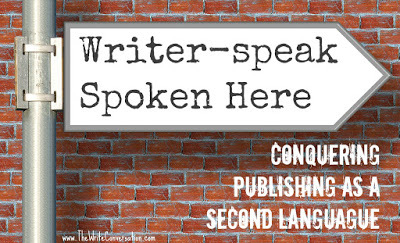 PSL - Publishing as a Second Languageby Linda Gilden @LindaGilden
PSL - Publishing as a Second Languageby Linda Gilden @LindaGildenSimultaneous submission is another writing term that is seemingly self-explanatory, right? Well, yes.
Just send a manuscript simultaneously to several publishers. But there are a few things that will help you understand how the process works.For BooksWhen I first started submitting books, I was a bit timid to try out the simultaneous submission thing. What if I messed up? What if more than one publisher wanted my book? How would I ever keep track of all the details?
 Waiting to hear about a book proposal can take months.So for a few years I only sent one proposal at a time. If you're familiar with the process, you know that waiting to hear from a publisher about a book proposal can take months. Way back then (as my grandchildren would say) there were no email submissions, only postal submissions in big brown envelopes. Waiting for an answer seemed like forever and it was often more than six months waiting for a reply. So at best, you could probably only send your book proposal to two publishers a year. If I had continued to follow my one-at-a-time plan, my first book would probably be still making the rounds!
Waiting to hear about a book proposal can take months.So for a few years I only sent one proposal at a time. If you're familiar with the process, you know that waiting to hear from a publisher about a book proposal can take months. Way back then (as my grandchildren would say) there were no email submissions, only postal submissions in big brown envelopes. Waiting for an answer seemed like forever and it was often more than six months waiting for a reply. So at best, you could probably only send your book proposal to two publishers a year. If I had continued to follow my one-at-a-time plan, my first book would probably be still making the rounds!It is very simple and safe to submit a proposal to more than one publisher at a time. Publishers actually expect it. The key to doing this successfully is to keep good records so you will know where your manuscripts are at all times. Whether you are still hanging on to an index card file or using a computer-created chart, the important thing is that you have it in a format you can easily read and add to with each communication.
Some of the crucial elements to your record keeping are: Name of manuscript. Date submitted. To whom it was sent – publisher and editor name. Simultaneous or not. Responses from the publisher.
For quick reference I include projected word count and whether or not the manuscript is complete. I also like to have a column for other potential markets if none of the originals bring in a contract. Always be sure to record in the response column whether or not your manuscript is going to a committee, has passed a committee, or something else. That way you know when to pray especially for those meetings.
For Articles
 simultaneous submissions aren't as common with articles.I have heard several professional writers say that they send out simultaneous submissions for articles as well as books. Because the response time for articles is usually less for articles, I don’t do this.
simultaneous submissions aren't as common with articles.I have heard several professional writers say that they send out simultaneous submissions for articles as well as books. Because the response time for articles is usually less for articles, I don’t do this. Another reason I don’t do this is because record keeping is even more important for article simultaneous submission. And since response time is shorter, there is much greater possibility of missing something. So I would rather be safe. However, in your record keeping chart for articles, I would definitely have a place to record multiple possible markets. That way if you receive a rejection, you are ready to resend your manuscript to another publication.
If you are going to submit to more than one publisher, whether a book or article, be sure to let them know at the time you submit. A simple line at the bottom of your cover or query letter that says, “This is a simultaneous submission,” will do.
What publishing terms have you confused? Be sure to leave your questions in the comments section below. Remember, this is a no-studpid-question zone!
TWEETABLESPublishing as a Second Language - tips on Simultaneous Submissions - @LindaGilden (Click to Tweet)
Learn the publishing lingo as you polish your #writing skills with @LindaGilden (Click to Tweet)
 Linda Gilden is a wife, mother, and grandmother. She finds great joy (and excellent writing material) in time spent with her family. Her favorite activity is floating in a pool with a good book surrounded by splashing children!
Linda Gilden is a wife, mother, and grandmother. She finds great joy (and excellent writing material) in time spent with her family. Her favorite activity is floating in a pool with a good book surrounded by splashing children!To find out more about Linda, her writing, and her ministry, visit www.lindagilden.com . You can also connect with her on Twitter @LindaGilden and Facebook at Author Linda Gilden.
Published on September 09, 2015 01:00
September 8, 2015
Don’t Rush Publication, Instead Spend Your Time on Excellence
by Cindy Sproles @CindyDevoted
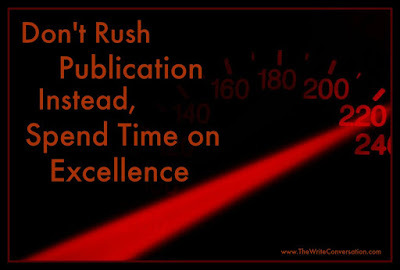 Don't rush publication, instead spend time on excellenceThere is more to being a writer than just putting words on a page. There’s responsibility, attitude, and expectations. So tell me, where does your heart lay and what’s your rush?
Don't rush publication, instead spend time on excellenceThere is more to being a writer than just putting words on a page. There’s responsibility, attitude, and expectations. So tell me, where does your heart lay and what’s your rush?
I posed these two questions at a recent writers conference where I taught.
My own ideas were put to the test when one writer asked the hot button question, “But if you can’t get a contract with your first book, why not self-publish?”The disclaimer first: I have nothing against self-publication. I believe there is a time and a situation when self-publication is the perfect answer. BUT, I’m not sure self-publication is the perfect answer, just for a new writer to be published.
 Publishing is a career filled with hard work.Publishing, at its best, is a trying career filled with hard work, waiting, and a small ratio of contracts offered compared to manuscripts written.
Publishing is a career filled with hard work.Publishing, at its best, is a trying career filled with hard work, waiting, and a small ratio of contracts offered compared to manuscripts written.
New writers find themselves frustrated and angry that their books are not receiving contracts.
Between the fists of the economy tightening around publishers and outdated business models, even well-seasoned authors experience high rejection rates.
Still there is something to be said for a writer’s bloody knees.
Our first works are rarely our best, even when we think they are – our writing may not be up to publication level. Our rejections in writing, force us to strive to learn the craft on a higher level. They make us angry enough to buckle down and refine the words. Those pesky rejections serve as a sifter, filtering out the serious writers from those who aren’t. Rejections are, and rightfully should be, our incentive to excel to the next level.
 Why not self-publish?So how does this all play into the “Why not self-publish,” question? It’s all a matter of attitude and a respect for the craft of writing. My question for those who grow impatient is, “What is your hurry?” Traditional publishing is not easy, and honestly, it’s not always fair, but the ultimate goal never changes. Quality writing must bethe end result.
Why not self-publish?So how does this all play into the “Why not self-publish,” question? It’s all a matter of attitude and a respect for the craft of writing. My question for those who grow impatient is, “What is your hurry?” Traditional publishing is not easy, and honestly, it’s not always fair, but the ultimate goal never changes. Quality writing must bethe end result.
It’s easy for us to insist we’ve dreamed of being a writer since childhood or that we have a story that will change lives. But if that is truly the case, why rush the process, when the process leads us to a better quality of work?
It is a question a writer has to answer for themselves and it does require some soul searching to see past our dream of being published and locate the reality of actually being ready to be published.
 Self-publication is a wonderful choice when it's
Self-publication is a wonderful choice when it's
used in the right situation.Self-publication is a wonderful choice when it’s used in the right situation. My challenge to you, the writer, is step aside of your dreams for a moment and look at the development of your work. Is the quality going to best represent your God given gift? If self-publication is the road for you, then take active steps by making the investment in your writing before putting the work into print. Make it the best piece you can so that years later it’s something that makes you proud.
If you choose self-publication follow these steps to make your work as successful as it can be:
Build a solid platform to sell the book. A book on the shelf is no good unless is ends up in the hands of a reader. And understand, that by having your book on Amazon or in distributor catalogue, does not sell a book. You sell the book.Invest in a CONTENT editor who can help you with plot, find holes, placement, and overall readability of the work. Don’t count on a proofer to catch the holes in a manuscript. Invest the money into a reputable CONTENT EDITOR. ($800-$1000 and up)Invest in a professional book cover designer that makes your book cover look professional – not self-published. Professional designers purchase licensed photos and they know the colors, images, concepts, and fonts that sell a book from the shelf. Your friend who does nice book covers may not be the right fit for your book. Consider the experienced professional, their knowledge and expertise. ($300-$500)Invest in an interior designer who can paginate your book properly with correct font sizes, proper ditch measurements, and accurate line spacing so your book looks professional not like a first grade reader. ($75-$150)Do your homework on printers, be it Amazon or an industry self-publishing firm.Consider print-on-demand over stock piling hundreds of books in your basement. Read the fine print of the self-publishing contract. Sometimes you are required to purchase hundreds of books upfront.Check references on self-publishing companies. If you were hiring a builder for your home you would check references – do the same for your book.Whatever method you choose, traditional or self-publishing, be sure you look at the business aspect. Make a decision based on your true ability to afford and sell the book. Before you push the yes button on self-publishing, search your heart. Ask those important, but hard questions that delve into the heart of the writer – why am I in such a hurry? Where does my heart lay?
TWEETABLES
Don't Rush Publication - Instead Spend Your Time on Excellence - @CindyDevoted (Click to Tweet)
It's hard to wait for publication, but it's the wise thing to do - @CindyDevoted (Click to Tweet)
 Cindy Sproles is an author and popular speaker. She is the cofounder of Christian Devotions ministries and managing editor of Straight Street Books and SonRise Devotionals, imprints of Lighthouse Publishing of the Carolinas. Cindy is the executive editor of www.christiandevotions.us and www.inspireafire.com. She teaches at writers conferences nationwide and directs The Asheville Christian Writers Conference - Writers Boot Camp.
Cindy Sproles is an author and popular speaker. She is the cofounder of Christian Devotions ministries and managing editor of Straight Street Books and SonRise Devotionals, imprints of Lighthouse Publishing of the Carolinas. Cindy is the executive editor of www.christiandevotions.us and www.inspireafire.com. She teaches at writers conferences nationwide and directs The Asheville Christian Writers Conference - Writers Boot Camp.
She is the author of two devotionals, He Said, She Said - Learning to Live a Life of Passion and New Sheets - Thirty Days to Refine You into the Woman You Can Be. Cindy's debut novel, Mercy's Rain, is available at major retailers. Visit Cindy at www.cindysproles.com and book her for your next conference or ladies retreat. Also connect with her on Facebook and Twitter.
 Don't rush publication, instead spend time on excellenceThere is more to being a writer than just putting words on a page. There’s responsibility, attitude, and expectations. So tell me, where does your heart lay and what’s your rush?
Don't rush publication, instead spend time on excellenceThere is more to being a writer than just putting words on a page. There’s responsibility, attitude, and expectations. So tell me, where does your heart lay and what’s your rush? I posed these two questions at a recent writers conference where I taught.
My own ideas were put to the test when one writer asked the hot button question, “But if you can’t get a contract with your first book, why not self-publish?”The disclaimer first: I have nothing against self-publication. I believe there is a time and a situation when self-publication is the perfect answer. BUT, I’m not sure self-publication is the perfect answer, just for a new writer to be published.
 Publishing is a career filled with hard work.Publishing, at its best, is a trying career filled with hard work, waiting, and a small ratio of contracts offered compared to manuscripts written.
Publishing is a career filled with hard work.Publishing, at its best, is a trying career filled with hard work, waiting, and a small ratio of contracts offered compared to manuscripts written. New writers find themselves frustrated and angry that their books are not receiving contracts.
Between the fists of the economy tightening around publishers and outdated business models, even well-seasoned authors experience high rejection rates.
Still there is something to be said for a writer’s bloody knees.
Our first works are rarely our best, even when we think they are – our writing may not be up to publication level. Our rejections in writing, force us to strive to learn the craft on a higher level. They make us angry enough to buckle down and refine the words. Those pesky rejections serve as a sifter, filtering out the serious writers from those who aren’t. Rejections are, and rightfully should be, our incentive to excel to the next level.
 Why not self-publish?So how does this all play into the “Why not self-publish,” question? It’s all a matter of attitude and a respect for the craft of writing. My question for those who grow impatient is, “What is your hurry?” Traditional publishing is not easy, and honestly, it’s not always fair, but the ultimate goal never changes. Quality writing must bethe end result.
Why not self-publish?So how does this all play into the “Why not self-publish,” question? It’s all a matter of attitude and a respect for the craft of writing. My question for those who grow impatient is, “What is your hurry?” Traditional publishing is not easy, and honestly, it’s not always fair, but the ultimate goal never changes. Quality writing must bethe end result.It’s easy for us to insist we’ve dreamed of being a writer since childhood or that we have a story that will change lives. But if that is truly the case, why rush the process, when the process leads us to a better quality of work?
It is a question a writer has to answer for themselves and it does require some soul searching to see past our dream of being published and locate the reality of actually being ready to be published.
 Self-publication is a wonderful choice when it's
Self-publication is a wonderful choice when it'sused in the right situation.Self-publication is a wonderful choice when it’s used in the right situation. My challenge to you, the writer, is step aside of your dreams for a moment and look at the development of your work. Is the quality going to best represent your God given gift? If self-publication is the road for you, then take active steps by making the investment in your writing before putting the work into print. Make it the best piece you can so that years later it’s something that makes you proud.
If you choose self-publication follow these steps to make your work as successful as it can be:
Build a solid platform to sell the book. A book on the shelf is no good unless is ends up in the hands of a reader. And understand, that by having your book on Amazon or in distributor catalogue, does not sell a book. You sell the book.Invest in a CONTENT editor who can help you with plot, find holes, placement, and overall readability of the work. Don’t count on a proofer to catch the holes in a manuscript. Invest the money into a reputable CONTENT EDITOR. ($800-$1000 and up)Invest in a professional book cover designer that makes your book cover look professional – not self-published. Professional designers purchase licensed photos and they know the colors, images, concepts, and fonts that sell a book from the shelf. Your friend who does nice book covers may not be the right fit for your book. Consider the experienced professional, their knowledge and expertise. ($300-$500)Invest in an interior designer who can paginate your book properly with correct font sizes, proper ditch measurements, and accurate line spacing so your book looks professional not like a first grade reader. ($75-$150)Do your homework on printers, be it Amazon or an industry self-publishing firm.Consider print-on-demand over stock piling hundreds of books in your basement. Read the fine print of the self-publishing contract. Sometimes you are required to purchase hundreds of books upfront.Check references on self-publishing companies. If you were hiring a builder for your home you would check references – do the same for your book.Whatever method you choose, traditional or self-publishing, be sure you look at the business aspect. Make a decision based on your true ability to afford and sell the book. Before you push the yes button on self-publishing, search your heart. Ask those important, but hard questions that delve into the heart of the writer – why am I in such a hurry? Where does my heart lay?
TWEETABLES
Don't Rush Publication - Instead Spend Your Time on Excellence - @CindyDevoted (Click to Tweet)
It's hard to wait for publication, but it's the wise thing to do - @CindyDevoted (Click to Tweet)
 Cindy Sproles is an author and popular speaker. She is the cofounder of Christian Devotions ministries and managing editor of Straight Street Books and SonRise Devotionals, imprints of Lighthouse Publishing of the Carolinas. Cindy is the executive editor of www.christiandevotions.us and www.inspireafire.com. She teaches at writers conferences nationwide and directs The Asheville Christian Writers Conference - Writers Boot Camp.
Cindy Sproles is an author and popular speaker. She is the cofounder of Christian Devotions ministries and managing editor of Straight Street Books and SonRise Devotionals, imprints of Lighthouse Publishing of the Carolinas. Cindy is the executive editor of www.christiandevotions.us and www.inspireafire.com. She teaches at writers conferences nationwide and directs The Asheville Christian Writers Conference - Writers Boot Camp. She is the author of two devotionals, He Said, She Said - Learning to Live a Life of Passion and New Sheets - Thirty Days to Refine You into the Woman You Can Be. Cindy's debut novel, Mercy's Rain, is available at major retailers. Visit Cindy at www.cindysproles.com and book her for your next conference or ladies retreat. Also connect with her on Facebook and Twitter.
Published on September 08, 2015 01:00
September 7, 2015
Blogging for Writers, Part 2 - So What Do I Blog About?
by Edie Melson @EdieMelson
 Now that we’re all on the same page about blog versus website, the next step is deciding whether or not blogging is a good fit for you personally. Blogging takes a commitment. It’s almost like the decision we each had to make when we decided to call ourselves writers.
Now that we’re all on the same page about blog versus website, the next step is deciding whether or not blogging is a good fit for you personally. Blogging takes a commitment. It’s almost like the decision we each had to make when we decided to call ourselves writers.
There is rarely a blog that is an overnight success. I have seen it happen a couple of time, but we should begin expecting growth and benefits to take time.For writers, there are definite benefits to blogging: It provides a place to connect with our readers on a deeper level. Social media is a good way for casual connections, but a blog is a place where we and our audience can get to know us better. It provides a place to practice writing. Blogging helped me move from writing when I felt like it, to writing when I had too. Every professional writer has to make this transition.It provides a place to prove to industry professionals that we can write on a deadline and produce quality work. When we write for pay, those who pay us expect us to turn things in on a schedule. Blogging regularly shows that we’ve mastered this basic skill.It provides a place to prove our audience. For non-fiction writers it can be a place to prove that there’s an audience for the topic we’re writing about. For fiction (and non-fiction) writers is can prove that we can connect to readers through the written word.
It provides a place to connect with our readers on a deeper level. Social media is a good way for casual connections, but a blog is a place where we and our audience can get to know us better. It provides a place to practice writing. Blogging helped me move from writing when I felt like it, to writing when I had too. Every professional writer has to make this transition.It provides a place to prove to industry professionals that we can write on a deadline and produce quality work. When we write for pay, those who pay us expect us to turn things in on a schedule. Blogging regularly shows that we’ve mastered this basic skill.It provides a place to prove our audience. For non-fiction writers it can be a place to prove that there’s an audience for the topic we’re writing about. For fiction (and non-fiction) writers is can prove that we can connect to readers through the written word.
2 things things blogging is NOT designed to do:It doesn't provide a great way to sell books. Yes, some authors do sell books on their sites, but it's not the best (or even a good way) to generate book sales.It doesn't provide a place to run non-stop commercials promoting yourself and your books. A blog has to provide value. I don't know anyone who finds commercials (even infomercials) valuable.
What's Next? Once we’ve made the decision to blog, we need to figure out what to blog about. Finding a focus for your blog is really the hardest part of blogging. And it should fit in with what you share on social media.
Once we’ve made the decision to blog, we need to figure out what to blog about. Finding a focus for your blog is really the hardest part of blogging. And it should fit in with what you share on social media.
It’s sometimes easier for non-fiction writers to find a focus, because they’re usually drawn to write about topics they’re passionate about.
For fiction writers, it’s the stories and characters that grab our attention. We may include topics, but that’s not our focus. It’s also not possible to characterize our fiction readers in a topical manner. For example, not all readers of suspense drink coffee and love to ride roller coasters. Suspense readers come in every shape and size, with interests from motorcycle riding to keeping cats.
Beyond that, unless we’re already famous novelists, we’re going to get very few followers just because we’re authors. So we have to find another way to connect with our audience.
So what’s a writer to do?We must write about something we’re passionate about. Perhaps it’s travel, motorcycle riding, history or even knitting, I don’t hide the fact that I’m a writer, but that isn’t my focus. Then, as the blog following grows, my name comes up more and more often. My loyal blog followers are happy to share my writing successes and my platform builds.
One ACFW member who has had great success with this is RITA nominee, Beth Vogt. She loves quotes, and she loves photography. So she’s built her blog around that. Here’s a link so you can see how she has made this work. http://www.bethvogt.com/blog/.
There are lots of successful blogs by authors throughout the Internet, too many to name. I recommend you take a look at what your fellow authors are doing and let their creativity inspire you!
Now it’s your turn, what creative blogs have you visited. If you’d like to get other opinions on a potential blog idea, audition it by sharing your thoughts in the comments section below. We’ll be happy to chime in and help you find something that fits!
Don’t forget to join the conversation,Blessings,
Edie
TWEETABLES
What's a writer to #blog about? - thoughts from expert blogger @EdieMelson (Click to Tweet)
#Blogging isn't a one-size-fits-all propositions for writers - thoughts from @EdieMelson (Click to Tweet)
Blogging For Writers
Part 1 - Blog or Website, Which Does a Writer Really Need
Part 2 - So What Do I Blog About
 Now that we’re all on the same page about blog versus website, the next step is deciding whether or not blogging is a good fit for you personally. Blogging takes a commitment. It’s almost like the decision we each had to make when we decided to call ourselves writers.
Now that we’re all on the same page about blog versus website, the next step is deciding whether or not blogging is a good fit for you personally. Blogging takes a commitment. It’s almost like the decision we each had to make when we decided to call ourselves writers. There is rarely a blog that is an overnight success. I have seen it happen a couple of time, but we should begin expecting growth and benefits to take time.For writers, there are definite benefits to blogging:
 It provides a place to connect with our readers on a deeper level. Social media is a good way for casual connections, but a blog is a place where we and our audience can get to know us better. It provides a place to practice writing. Blogging helped me move from writing when I felt like it, to writing when I had too. Every professional writer has to make this transition.It provides a place to prove to industry professionals that we can write on a deadline and produce quality work. When we write for pay, those who pay us expect us to turn things in on a schedule. Blogging regularly shows that we’ve mastered this basic skill.It provides a place to prove our audience. For non-fiction writers it can be a place to prove that there’s an audience for the topic we’re writing about. For fiction (and non-fiction) writers is can prove that we can connect to readers through the written word.
It provides a place to connect with our readers on a deeper level. Social media is a good way for casual connections, but a blog is a place where we and our audience can get to know us better. It provides a place to practice writing. Blogging helped me move from writing when I felt like it, to writing when I had too. Every professional writer has to make this transition.It provides a place to prove to industry professionals that we can write on a deadline and produce quality work. When we write for pay, those who pay us expect us to turn things in on a schedule. Blogging regularly shows that we’ve mastered this basic skill.It provides a place to prove our audience. For non-fiction writers it can be a place to prove that there’s an audience for the topic we’re writing about. For fiction (and non-fiction) writers is can prove that we can connect to readers through the written word.2 things things blogging is NOT designed to do:It doesn't provide a great way to sell books. Yes, some authors do sell books on their sites, but it's not the best (or even a good way) to generate book sales.It doesn't provide a place to run non-stop commercials promoting yourself and your books. A blog has to provide value. I don't know anyone who finds commercials (even infomercials) valuable.
What's Next?
 Once we’ve made the decision to blog, we need to figure out what to blog about. Finding a focus for your blog is really the hardest part of blogging. And it should fit in with what you share on social media.
Once we’ve made the decision to blog, we need to figure out what to blog about. Finding a focus for your blog is really the hardest part of blogging. And it should fit in with what you share on social media.It’s sometimes easier for non-fiction writers to find a focus, because they’re usually drawn to write about topics they’re passionate about.
For fiction writers, it’s the stories and characters that grab our attention. We may include topics, but that’s not our focus. It’s also not possible to characterize our fiction readers in a topical manner. For example, not all readers of suspense drink coffee and love to ride roller coasters. Suspense readers come in every shape and size, with interests from motorcycle riding to keeping cats.
Beyond that, unless we’re already famous novelists, we’re going to get very few followers just because we’re authors. So we have to find another way to connect with our audience.
So what’s a writer to do?We must write about something we’re passionate about. Perhaps it’s travel, motorcycle riding, history or even knitting, I don’t hide the fact that I’m a writer, but that isn’t my focus. Then, as the blog following grows, my name comes up more and more often. My loyal blog followers are happy to share my writing successes and my platform builds.
One ACFW member who has had great success with this is RITA nominee, Beth Vogt. She loves quotes, and she loves photography. So she’s built her blog around that. Here’s a link so you can see how she has made this work. http://www.bethvogt.com/blog/.
There are lots of successful blogs by authors throughout the Internet, too many to name. I recommend you take a look at what your fellow authors are doing and let their creativity inspire you!
Now it’s your turn, what creative blogs have you visited. If you’d like to get other opinions on a potential blog idea, audition it by sharing your thoughts in the comments section below. We’ll be happy to chime in and help you find something that fits!
Don’t forget to join the conversation,Blessings,
Edie
TWEETABLES
What's a writer to #blog about? - thoughts from expert blogger @EdieMelson (Click to Tweet)
#Blogging isn't a one-size-fits-all propositions for writers - thoughts from @EdieMelson (Click to Tweet)
Blogging For Writers
Part 1 - Blog or Website, Which Does a Writer Really Need
Part 2 - So What Do I Blog About
Published on September 07, 2015 01:00
So What Do I Blog About?
by Edie Melson @EdieMelson
 Now that we’re all on the same page about blog versus website, the next step is deciding whether or not blogging is a good fit for you personally. Blogging takes a commitment. It’s almost like the decision we each had to make when we decided to call ourselves writers.
Now that we’re all on the same page about blog versus website, the next step is deciding whether or not blogging is a good fit for you personally. Blogging takes a commitment. It’s almost like the decision we each had to make when we decided to call ourselves writers.
There is rarely a blog that is an overnight success. I have seen it happen a couple of time, but we should begin expecting growth and benefits to take time.For writers, there are definite benefits to blogging: It provides a place to connect with our readers on a deeper level. Social media is a good way for casual connections, but a blog is a place where we and our audience can get to know us better. It provides a place to practice writing. Blogging helped me move from writing when I felt like it, to writing when I had too. Every professional writer has to make this transition.It provides a place to prove to industry professionals that we can write on a deadline and produce quality work. When we write for pay, those who pay us expect us to turn things in on a schedule. Blogging regularly shows that we’ve mastered this basic skill.It provides a place to prove our audience. For non-fiction writers it can be a place to prove that there’s an audience for the topic we’re writing about. For fiction (and non-fiction) writers is can prove that we can connect to readers through the written word.
It provides a place to connect with our readers on a deeper level. Social media is a good way for casual connections, but a blog is a place where we and our audience can get to know us better. It provides a place to practice writing. Blogging helped me move from writing when I felt like it, to writing when I had too. Every professional writer has to make this transition.It provides a place to prove to industry professionals that we can write on a deadline and produce quality work. When we write for pay, those who pay us expect us to turn things in on a schedule. Blogging regularly shows that we’ve mastered this basic skill.It provides a place to prove our audience. For non-fiction writers it can be a place to prove that there’s an audience for the topic we’re writing about. For fiction (and non-fiction) writers is can prove that we can connect to readers through the written word.
2 things things blogging is NOT designed to do:It doesn't provide a great way to sell books. Yes, some authors do sell books on their sites, but it's not the best (or even a good way) to generate book sales.It doesn't provide a place to run non-stop commercials promoting yourself and your books. A blog has to provide value. I don't know anyone who finds commercials (even infomercials) valuable.
What's Next? Once we’ve made the decision to blog, we need to figure out what to blog about. Finding a focus for your blog is really the hardest part of blogging. And it should fit in with what you share on social media.
Once we’ve made the decision to blog, we need to figure out what to blog about. Finding a focus for your blog is really the hardest part of blogging. And it should fit in with what you share on social media.
It’s sometimes easier for non-fiction writers to find a focus, because they’re usually drawn to write about topics they’re passionate about.
For fiction writers, it’s the stories and characters that grab our attention. We may include topics, but that’s not our focus. It’s also not possible to characterize our fiction readers in a topical manner. For example, not all readers of suspense drink coffee and love to ride roller coasters. Suspense readers come in every shape and size, with interests from motorcycle riding to keeping cats.
Beyond that, unless we’re already famous novelists, we’re going to get very few followers just because we’re authors. So we have to find another way to connect with our audience.
So what’s a writer to do?We must write about something we’re passionate about. Perhaps it’s travel, motorcycle riding, history or even knitting, I don’t hide the fact that I’m a writer, but that isn’t my focus. Then, as the blog following grows, my name comes up more and more often. My loyal blog followers are happy to share my writing successes and my platform builds.
One ACFW member who has had great success with this is RITA nominee, Beth Vogt. She loves quotes, and she loves photography. So she’s built her blog around that. Here’s a link so you can see how she has made this work. http://www.bethvogt.com/blog/.
There are lots of successful blogs by authors throughout the Internet, too many to name. I recommend you take a look at what your fellow authors are doing and let their creativity inspire you!
Now it’s your turn, what creative blogs have you visited. If you’d like to get other opinions on a potential blog idea, audition it by sharing your thoughts in the comments section below. We’ll be happy to chime in and help you find something that fits!
Don’t forget to join the conversation,Blessings,
Edie
TWEETABLES
What's a writer to #blog about? - thoughts from expert blogger @EdieMelson (Click to Tweet)
#Blogging isn't a one-size-fits-all propositions for writers - thoughts from @EdieMelson (Click to Tweet)
 Now that we’re all on the same page about blog versus website, the next step is deciding whether or not blogging is a good fit for you personally. Blogging takes a commitment. It’s almost like the decision we each had to make when we decided to call ourselves writers.
Now that we’re all on the same page about blog versus website, the next step is deciding whether or not blogging is a good fit for you personally. Blogging takes a commitment. It’s almost like the decision we each had to make when we decided to call ourselves writers. There is rarely a blog that is an overnight success. I have seen it happen a couple of time, but we should begin expecting growth and benefits to take time.For writers, there are definite benefits to blogging:
 It provides a place to connect with our readers on a deeper level. Social media is a good way for casual connections, but a blog is a place where we and our audience can get to know us better. It provides a place to practice writing. Blogging helped me move from writing when I felt like it, to writing when I had too. Every professional writer has to make this transition.It provides a place to prove to industry professionals that we can write on a deadline and produce quality work. When we write for pay, those who pay us expect us to turn things in on a schedule. Blogging regularly shows that we’ve mastered this basic skill.It provides a place to prove our audience. For non-fiction writers it can be a place to prove that there’s an audience for the topic we’re writing about. For fiction (and non-fiction) writers is can prove that we can connect to readers through the written word.
It provides a place to connect with our readers on a deeper level. Social media is a good way for casual connections, but a blog is a place where we and our audience can get to know us better. It provides a place to practice writing. Blogging helped me move from writing when I felt like it, to writing when I had too. Every professional writer has to make this transition.It provides a place to prove to industry professionals that we can write on a deadline and produce quality work. When we write for pay, those who pay us expect us to turn things in on a schedule. Blogging regularly shows that we’ve mastered this basic skill.It provides a place to prove our audience. For non-fiction writers it can be a place to prove that there’s an audience for the topic we’re writing about. For fiction (and non-fiction) writers is can prove that we can connect to readers through the written word.2 things things blogging is NOT designed to do:It doesn't provide a great way to sell books. Yes, some authors do sell books on their sites, but it's not the best (or even a good way) to generate book sales.It doesn't provide a place to run non-stop commercials promoting yourself and your books. A blog has to provide value. I don't know anyone who finds commercials (even infomercials) valuable.
What's Next?
 Once we’ve made the decision to blog, we need to figure out what to blog about. Finding a focus for your blog is really the hardest part of blogging. And it should fit in with what you share on social media.
Once we’ve made the decision to blog, we need to figure out what to blog about. Finding a focus for your blog is really the hardest part of blogging. And it should fit in with what you share on social media.It’s sometimes easier for non-fiction writers to find a focus, because they’re usually drawn to write about topics they’re passionate about.
For fiction writers, it’s the stories and characters that grab our attention. We may include topics, but that’s not our focus. It’s also not possible to characterize our fiction readers in a topical manner. For example, not all readers of suspense drink coffee and love to ride roller coasters. Suspense readers come in every shape and size, with interests from motorcycle riding to keeping cats.
Beyond that, unless we’re already famous novelists, we’re going to get very few followers just because we’re authors. So we have to find another way to connect with our audience.
So what’s a writer to do?We must write about something we’re passionate about. Perhaps it’s travel, motorcycle riding, history or even knitting, I don’t hide the fact that I’m a writer, but that isn’t my focus. Then, as the blog following grows, my name comes up more and more often. My loyal blog followers are happy to share my writing successes and my platform builds.
One ACFW member who has had great success with this is RITA nominee, Beth Vogt. She loves quotes, and she loves photography. So she’s built her blog around that. Here’s a link so you can see how she has made this work. http://www.bethvogt.com/blog/.
There are lots of successful blogs by authors throughout the Internet, too many to name. I recommend you take a look at what your fellow authors are doing and let their creativity inspire you!
Now it’s your turn, what creative blogs have you visited. If you’d like to get other opinions on a potential blog idea, audition it by sharing your thoughts in the comments section below. We’ll be happy to chime in and help you find something that fits!
Don’t forget to join the conversation,Blessings,
Edie
TWEETABLES
What's a writer to #blog about? - thoughts from expert blogger @EdieMelson (Click to Tweet)
#Blogging isn't a one-size-fits-all propositions for writers - thoughts from @EdieMelson (Click to Tweet)
Published on September 07, 2015 01:00
September 6, 2015
The Transforming Breath of God
Your name will no longer be Abram, but your name will be Abraham, for I will make you the father of many nations . . . God also said to Abraham, "As for Sarai your wife, you are no longer to call her Sarai; her name will be Sarah. Genesis 17:5, 15
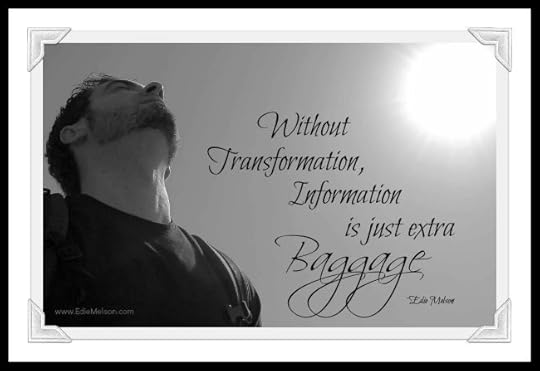 So often we become God’s children, long before we allow Him to breathe life into our lives. Our hearts belong to him, but we often resist the changes He wants to make in us.
So often we become God’s children, long before we allow Him to breathe life into our lives. Our hearts belong to him, but we often resist the changes He wants to make in us.
I think the same thing was true of Abraham and Sarah. They followed God for quite a while before they actually let Him make the changes He wanted. These verses are the outward evidence of the changes God made in them.
The changes God made to their names held great significance. He added an H to both their names. If you say the sound that an H makes, it’s an exhalation of breath. I think this is the evidence that they had allowed God to breathe life into their lives.
God also breathes into our lives. He speaks to us in many ways. We have much more of Him than those in the Bible. We have His Holy Spirit, and we have His Living Word. But the truth is, if we don’t allow what God is giving us to transform us, it’s just head knowledge.
Without transformation, information is just extra baggage.
It is our responsibility to apply the things God speaks into our lives. This realization has caused me to think more about how my life would change, if I allowed Him to breath life into my current circumstances? Definitely something to ponder. Be sure to share your thoughts in the comments section below.
Don’t forget to join the conversationBlessings,Edie
TWEETABLEWithout transformation, the information God shares with us is just extra baggage.(Click to Tweet)
 So often we become God’s children, long before we allow Him to breathe life into our lives. Our hearts belong to him, but we often resist the changes He wants to make in us.
So often we become God’s children, long before we allow Him to breathe life into our lives. Our hearts belong to him, but we often resist the changes He wants to make in us.I think the same thing was true of Abraham and Sarah. They followed God for quite a while before they actually let Him make the changes He wanted. These verses are the outward evidence of the changes God made in them.
The changes God made to their names held great significance. He added an H to both their names. If you say the sound that an H makes, it’s an exhalation of breath. I think this is the evidence that they had allowed God to breathe life into their lives.
God also breathes into our lives. He speaks to us in many ways. We have much more of Him than those in the Bible. We have His Holy Spirit, and we have His Living Word. But the truth is, if we don’t allow what God is giving us to transform us, it’s just head knowledge.
Without transformation, information is just extra baggage.
It is our responsibility to apply the things God speaks into our lives. This realization has caused me to think more about how my life would change, if I allowed Him to breath life into my current circumstances? Definitely something to ponder. Be sure to share your thoughts in the comments section below.
Don’t forget to join the conversationBlessings,Edie
TWEETABLEWithout transformation, the information God shares with us is just extra baggage.(Click to Tweet)
Published on September 06, 2015 01:00
September 5, 2015
Trusting God for the Unseen
by Edie Melson @EdieMelson
I snapped the picture last year in the Rocky Mountain National Park. These magnificent views reminded me anew about the greatness of our God. I believe faith is important, but I also believe God gives us concrete moments to hang onto when our faith needs to stretch.
What do you think? How have your experiences strengthened your faith?
 "All I have seen teaches me to trust the Creator for all I have not seen." Ralph Waldo Emerson
"All I have seen teaches me to trust the Creator for all I have not seen." Ralph Waldo Emerson
Be sure to share your thoughts in the comments section below.
I invite you to use this image any way you like online. Post it to your blog, share it on Facebook, Twitter, Pinterest, anywhere you'd like. All I ask is that you keep it intact, with my website watermark visible.
Don't forget to join the conversation!Blessings,Edie
TWEETABLE
Trusting #God for the Unseen by seeing what He's done - @EdieMelson (Click to Tweet)
I snapped the picture last year in the Rocky Mountain National Park. These magnificent views reminded me anew about the greatness of our God. I believe faith is important, but I also believe God gives us concrete moments to hang onto when our faith needs to stretch.
What do you think? How have your experiences strengthened your faith?
 "All I have seen teaches me to trust the Creator for all I have not seen." Ralph Waldo Emerson
"All I have seen teaches me to trust the Creator for all I have not seen." Ralph Waldo EmersonBe sure to share your thoughts in the comments section below.
I invite you to use this image any way you like online. Post it to your blog, share it on Facebook, Twitter, Pinterest, anywhere you'd like. All I ask is that you keep it intact, with my website watermark visible.
Don't forget to join the conversation!Blessings,Edie
TWEETABLE
Trusting #God for the Unseen by seeing what He's done - @EdieMelson (Click to Tweet)
Published on September 05, 2015 01:00



